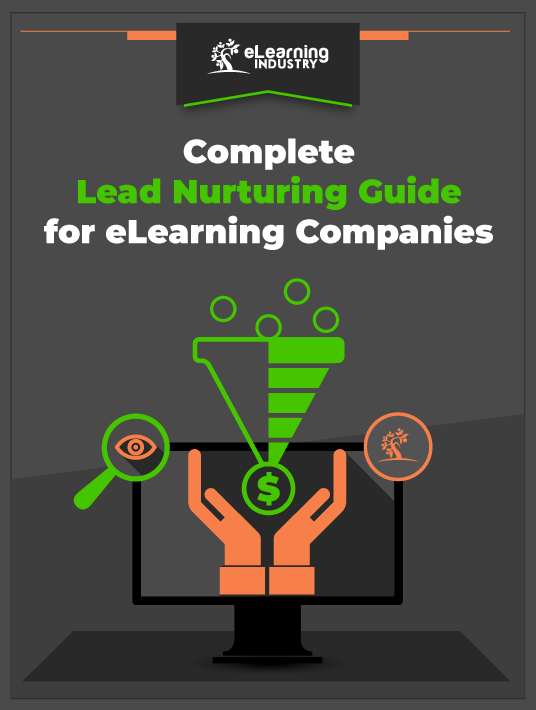5 Profitable Methods To Increase The Performance Of Your Lead Nurturing Campaigns
In a constantly developing era of digital marketing, finding ways to nurture leads has acquired solid importance in the eLearning industry. More and more businesses that rely on inbound marketing develop a lead nurturing strategy to accompany their lead generation. For this reason, it is essential to define common tricks that will increase your chances of lead conversion.
Before moving further, let us define lead nurturing. What is lead nurturing? In simple terms, nurturing a lead is the process of identifying leads that have not yet converted into customers and guiding them throughout the process. As a strategy, this includes two vital factors:
-
Buyer profile
Know your market. We can't state enough how essential it is to get in your customers' shoes, regardless of the industry you are in. If a prospective buyer is searching for your solution, you should be there and assist appropriately.
A buyer profile can include information that varies from business to business. Data like characteristics, industry, role, title, and interests are some among the many that can assist your lead nurturing strategy. That is why you should consider crafting buyer personas to include all this information and have it ready to use in your strategic marketing plan.
-
Stage of buying process
Now that you have enough information on your prospective buyer, you need to figure out the stage they are currently in. By "stage," we mean how far they are from converting into customers. Identifying your leads in the marketing funnel can provide you with valuable data to identify problems and/or uncover possible optimization opportunities.
Craft your marketing funnel and identify every step of the process. Then utilize the marketing funnel to track your lead's journey. If your leads do not convert, see the stage they were in, identify the problem, and act accordingly.
Now that we have defined how to nurture leads, let's explain its importance in the eLearning sphere.

Why Is It Important To Nurture Leads?
When it comes to leads, nothing is certain. Even filling up your marketing funnels with lead generation techniques does nothing if these leads do not convert in the end.
For example, imagine your prospective customer finding your website. They know what they need and think that the solution is in your business. However, they seem to have taken too much time to find the information they need from you and left on a journey towards your competition. This results in losing a lead that you could have converted.
This is where lead nurturing comes into play to save the day. To keep your leads from abandoning your website, it is important to build a trustful relationship with them by addressing their needs in a timely manner.
Are you still wondering how to nurture leads successfully? Let's find out in the next section!
5 Tips To Nurture Leads For Your eLearning Business
Now that we have given a lead nurturing definition and addressed its importance in sales and marketing, we can safely move on to some lead nurturing best practices that promise to increase your conversion rate.
1. Utilize Your Buyer Personas
First and foremost, you should craft and update your buyer personas regularly. These profiles resemble your target group and should include valuable information that affects your conversion rates. Moreover, in a constantly changing environment, your buyer personas should not remain stable. Every once in a while, when you spot a change in your target market, you might want to update these profiles as well. Ideally, you want your buyer personas to include information like:
- Roles, titles
- Demographics
- Behaviors
- Problems
- Buying decisions
What does this have to do with lead nurturing, though? Well, it touches heavily on the "know your leads" part. By using the information from the personas, you can create marketing initiatives that are tailored to each occasion. It is your handbook for your buyers, and it can help you get the leads back in the sales funnel and guide them toward conversion.
2. Personalization Is The Key
Your leads are not robots or AI. They are human beings and prefer to be addressed as such. That said, personalization is an important part of the lead nurturing process. Not only can it switch the tone to a more conversational space, but it can also secure deals. How to do that? Well, by following the below-mentioned steps.
a) Listen To Your Audience
This one is even better applicable to one-to-one conversations. Next time you are on a call with a lead, make sure it is a conversation and not a sales pitch. Making your leads feel comfortable talking with you can increase your chances. Listen instead of talking for a while, and you will acquire enough data for personalization to fuel your next lead nurture campaigns.
b) Take Notes
Either in one-to-one conversations or QAs, taking notes of personal patterns can prove useful. These notes can help you add a personal touch to the next email or call and build a trusting environment.
c) Create Personalized Content
Now that you know more about your leads and have taken down important notes, it is time to put them into action with engaging content. In short, avoid creating generic content for all your email campaigns or ads. Segment your leads, read your buyer personas, and start crafting content for each segmentation to include in the automated process.
Join our email list if you wish to receive even more insightful articles and resources like this.
3. Leverage Lead Scoring
One thing is certain here: you cannot focus on all the leads that arrive in your sales funnel. You need a tactic to figure out the priority in leads. Who is most likely to convert? These are the ones you should focus your attention on. This tactic is commonly known as lead scoring. In simple terms, lead scoring is the process of identifying, prioritizing, and analyzing leads based on key points you attribute to them.
There are several benefits of lead scoring, such as:
a) Identifying Hot Leads
We have already mentioned the importance of segmenting your target audience. Having this in mind, let's address the segmentation of your leads. Identifying the probability of purchase on a lead can be beneficial for your marketing and sales efforts. After all, only a handful of leads are ready to buy your product, and you should figure out who those are by analyzing their behavior on your website. You should also contribute the right resources on hot leads to secure a positive outcome.
Where is the lead in the buying journey? What actions did they take? In which buyer persona do they belong? These are some of the questions which lead scoring answers for you to help you figure out your next move.
b) More Efficient Resource Distribution
There is no business with unlimited resources. Especially in the eLearning industry, businesses aim to distribute their resources in the best way possible to receive the desired results. In that sense, lead scoring helps organizations determine which segments they should focus on more. According to several studies, only 25% of the leads are ready to buy your product. This leaves a 75% that is not qualified to convert. Would you spend the same amount of resources on this 75% which is less likely to buy?
With the appropriate use of lead scoring, you can decide where to focus most of your efforts and convert most of the 25% which is already qualified. Needless to say that it does not mean that you would leave the remaining 75% in the air, but you will definitely spend fewer resources there. Or at least you should optimize your lead nurturing efforts and create more effective campaigns to lead them down the funnel. There's a reason that you haven't convinced them yet.
c) Increased Sales
At the end of the day, if you identify the hot leads of the customer funnel and contribute your resources wisely, the outcome will affect your sales. That is because you will be able to show your USP to the appropriate leads. Eventually, you will end up spending less to earn more. Therefore, your sales and marketing teams will become more efficient if they know the leads' needs and behaviors.
4. Use Multi-Channel Strategies To Nurture Leads
It might sound difficult, but when you want to nurture leads, you need to be everywhere. To be precise, for a high-level CRM, you ought to be everywhere your leads are. Even if you cannot follow up, you should make yourself accessible to your leads for information.
There are multiple channels that help you be in touch with your lead base. Some of the most commonly used channels are the following:
-
Social Media
Is there a better way to be close to your audience than through social media? These are the spots where your target audience is most likely to be. Moreover, on social media, your prospect leads might already be talking about you and your solutions. Therefore, you might want to be there to communicate with them, listen to their needs, and optimize your solutions. Also, social media and SEO are connected, so maybe you'll find new content ideas along the way!
-
Email Marketing
The ace in the sleeve when it comes to finding effective ways to nurture leads is hitting their inbox. Εmail marketing has managed to become the favorite tactic to draw your leads' attention in any state of the buyer's journey. The tricky part, however, is that you have to optimize the email on each occasion depending on how qualified the lead is and where it is in the marketing funnel.
For example, if the lead dropped off on the top of the funnel, then send them an email containing informative content, such as links to blog posts or eBooks. Was the lead one step away from buying but dropped off? Then hurry up and offer them a time-sensitive deal they cannot refuse!
-
Remarketing Campaign
At the end of the day, you can always follow the paid way. Such a way includes retargeting advertising on multiple platforms. You might want to consider using the data from your lead base and buyer personas to craft an automation process for this kind of ads. This channel might have some similarities with email marketing, but keep in mind that there are many people who ignore emails the moment they find them "promotional." Therefore, you should not rely on only one channel for remarketing purposes.
5. Early Follow-Up Gets The Lead
Every minute counts from the moment a prospect lead visits your website. Take that into account and help your leads convert in a timely manner before they convert on the website of your competitor. Especially in the case of qualified leads, an early follow-up can be directly translated into sales. That is because such leads are usually ready to buy and only need that little push to convert. Be there. Be present and act timely to assist your leads and witness your business grow.
Conclusion
Nurturing leads is a highly powerful asset for your eLearning business. Mastering its use and optimizing the process can eventually lead to a steady increase in sales. Needless to say that it requires solid research, trustful data, and an optimized application.
In this article, we have presented a handful of methods to ensure the positive outcome of your lead nurturing campaigns. In a nutshell, the above-mentioned methods require you to know your audience, be omnipresent, utilize lead scoring, and act quickly to secure conversions. By applying these techniques in both your manual and automated processes, you can increase your chances of closing valuable deals.
If you want to strengthen your knowledge further on lead nurturing in the eLearning industry, feel free to check out this article on lead nurturing strategies. Secure the lead, close the deal, and thrive!

